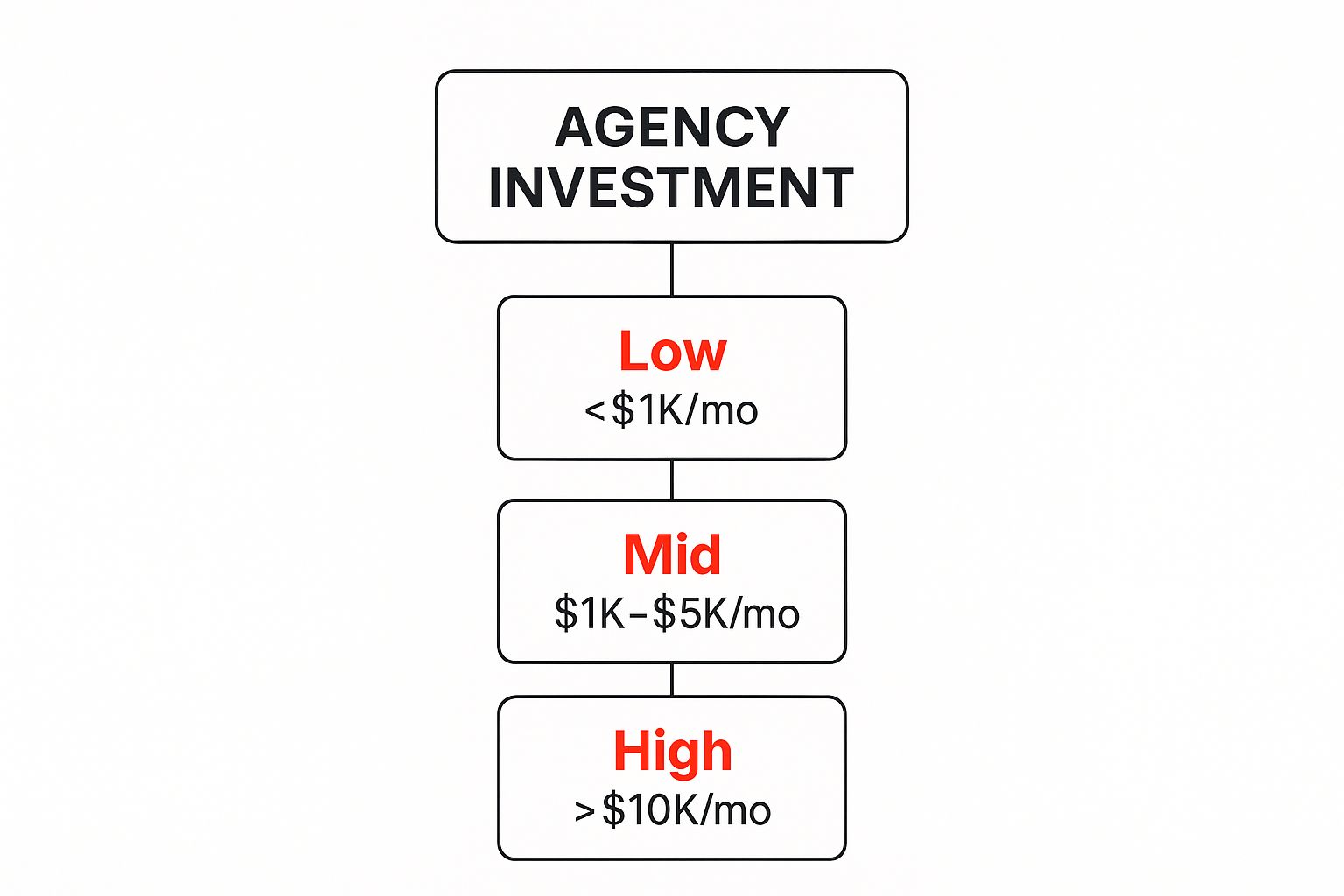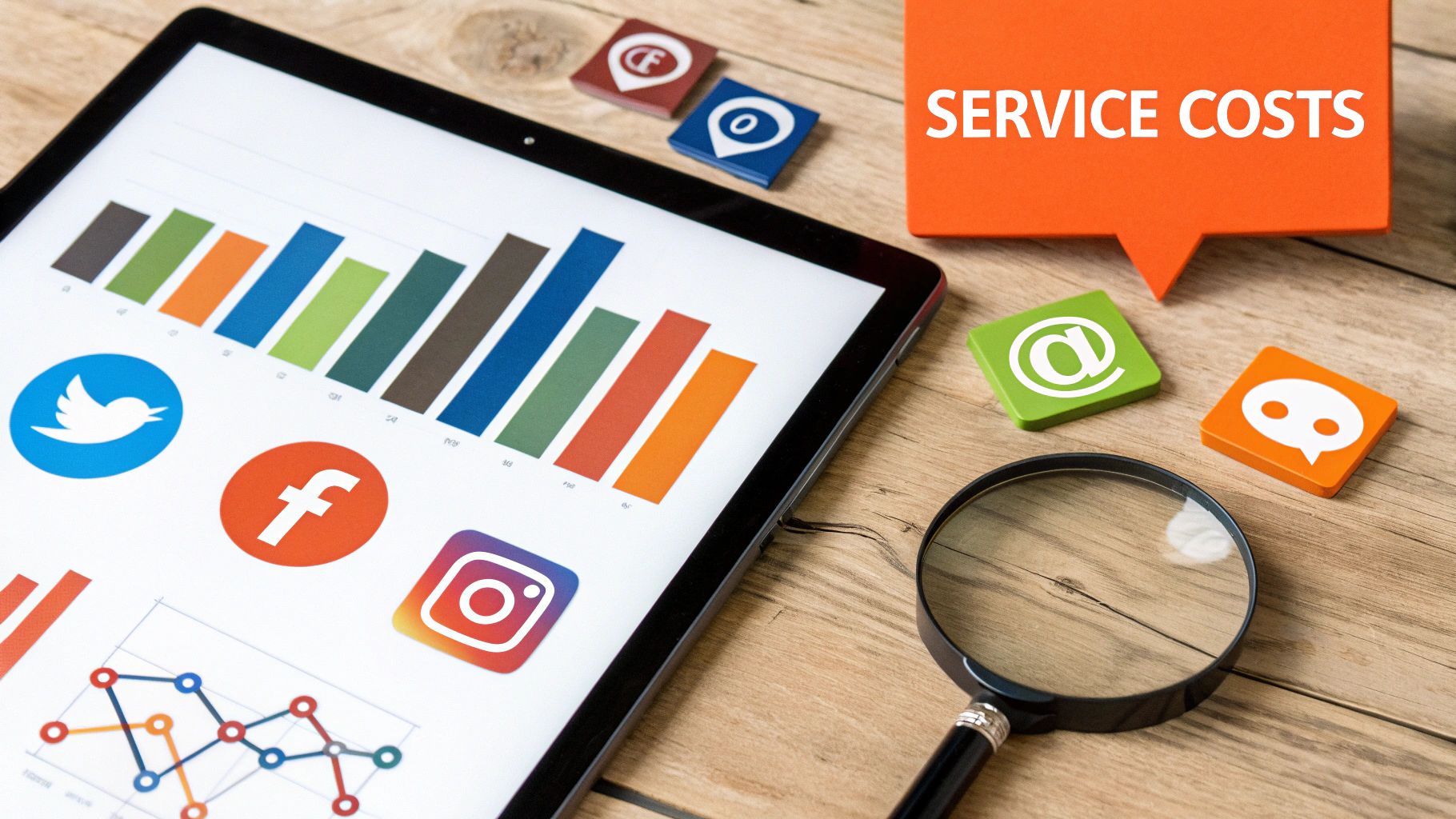
Decoding Digital Marketing Agency Costs: A Practical Guide
Hiring a digital marketing agency isn't like buying something off the shelf. It's commissioning a custom-built growth engine for your business. Because of that, digital marketing agency costs can swing wildly, from around $900 per month for a single, focused service to well over $20,000 per month for a full-blown, multi-channel strategy.
The final number on the proposal really just comes down to the scope of the work and the level of expertise you need to get the job done. This guide will give you practical examples and actionable insights to help you budget wisely and choose the right partner.
How Much Should You Expect to Invest?
When you bring on a marketing agency, you're paying for their experience, their strategic thinking, and their ability to execute. A practical way to think of it is like hiring a contractor for your home. You could hire a handyman to fix a leaky faucet (a small, project-based task), or you could hire a full-service firm to build a new addition (a comprehensive, ongoing retainer). The investment reflects the scale and complexity of the goal.
The investment you make will depend on a few key things: how ambitious your goals are, the size of your company, and exactly what services you need. For example, a local dental practice needing to attract 20 new patients a month has different needs than a national e-commerce brand aiming for a 50% increase in online sales.
Industry data shows that most businesses can expect to see monthly retainers fall somewhere between $900 and $20,000. This big range just reflects how different every company's needs are.
This infographic gives a great visual breakdown of what you might encounter.

As you can see, what you put in directly impacts the depth and breadth of the services you get back, from basic support to a fully integrated partnership.
Quick Look at Average Monthly Agency Costs
To give you a clearer starting point, here’s a quick summary of what you might expect to invest for different digital marketing services on a monthly basis.
| Digital Marketing Service | Typical Monthly Cost Range |
|---|---|
| SEO (Search Engine Optimization) | $1,500 – $5,000+ |
| PPC (Pay-Per-Click) Management | $1,000 – $10,000+ |
| Social Media Marketing | $900 – $7,000 |
| Content Marketing | $2,000 – $10,000+ |
| Email Marketing | $500 – $2,500 |
Remember, these are just ballpark figures. A simple local SEO campaign for a single-location coffee shop will be on the lower end. In contrast, a competitive national e-commerce PPC strategy for a fashion brand will naturally require a much larger investment to compete on high-value keywords.
Laying Your Financial Foundation
Before you even start talking to agencies, you need a clear financial game plan. A well-defined budget connects your spending to your actual business goals, making sure every dollar is working hard for you. This is the most important first step—it keeps you from overspending and sets the right expectations from day one.
Actionable Insight: Instead of asking "What's the most I can spend?", ask "What business goal am I trying to achieve, and what is that goal worth?" If a new client is worth $5,000 in lifetime value, investing $500 to acquire them is a clear win. Frame your budget around the value of the outcome.
To build that solid foundation, you have to get real about your numbers. A great place to start is learning how to create a smart marketing budget for small business, which can really guide your spending. This turns your budget from a simple expense line into a powerful tool for growth and helps you confidently evaluate any proposal an agency sends your way.
Understanding Common Agency Pricing Models

Before you can figure out what your digital marketing agency costs might look like, you have to get a handle on how they charge. Think of it like a phone plan: you can go with an unlimited monthly subscription, a pay-as-you-go option, or a one-time purchase. Each one makes sense for a different kind of user, and marketing agencies are no different.
The way an agency structures its pricing says a lot about your budget's predictability and what the partnership will feel like. Once you know the main models, you’ll be able to read between the lines on proposals and find a partner whose financial setup actually fits your business goals.
H3: Monthly Retainer: The Subscription Model
The monthly retainer is probably the most common setup you'll come across, especially for long-term marketing work. It's basically a subscription. You pay a fixed fee every month, and in return, you get an agreed-upon set of services and deliverables.
This model is a perfect fit for ongoing strategies like SEO, content marketing, or social media management—things where consistency is everything. For instance, a $3,000 monthly retainer for a B2B software company might cover a technical SEO audit, writing and publishing four in-depth blog posts, building 10 high-quality backlinks, and providing a monthly performance report.
The biggest win here? Predictability. You know exactly what you're spending on marketing each month, which makes budgeting a whole lot easier. It also lets the agency really dig in and become an extension of your team, getting to know your brand inside and out.
H3: Percentage Of Ad Spend: For Paid Campaigns
When you're running paid ads on platforms like Google Ads or Meta, the percentage of ad spend model is king. The agency takes a cut of your monthly ad budget as their management fee, usually somewhere between 10% and 20%.
Practical Example: You're an e-commerce store with a $10,000 monthly ad budget. The agency charges a 15% fee. This means you pay $1,500 to the agency for their management services, and the remaining $8,500 goes directly to Google or Meta for the ads themselves. Your total marketing cost for the campaign is $10,000. This model is smart because it ties the agency's success directly to yours. As your campaigns scale up and you invest more, their compensation grows too, giving them a real incentive to manage your budget wisely. Agencies that specialize in marketing automation for agencies often use this model to manage sophisticated, large-scale campaigns effectively.
H3: Project-Based Fees: For Defined Outcomes
Got a one-off project with a clear beginning and end? That’s where project-based pricing comes in. You agree on a single, fixed fee for a specific deliverable, like a website redesign, a new logo and branding guide, or building out a lead generation funnel.
A startup, for example, might pay a $15,000 project fee for a brand-new 10-page website, including design, development, and basic on-page SEO. This approach is fantastic for keeping a tight grip on your budget for standalone tasks. No surprises, no hidden costs.
Comparing Agency Pricing Models
To help you decide which approach works best for you, here’s a quick breakdown of the most common pricing models. Think about your goals, your budget, and how you prefer to work with a partner.
| Pricing Model | Best For | Pros | Cons |
|---|---|---|---|
| Monthly Retainer | Ongoing, long-term strategies like SEO, content marketing, or social media management. | Predictable monthly costs; fosters a deep, collaborative partnership. | Can be less flexible for short-term needs; scope creep is a risk. |
| Percentage of Ad Spend | Paid advertising campaigns on platforms like Google Ads, Meta, and LinkedIn. | Aligns agency success with campaign growth; simple to calculate. | Less predictable monthly cost; can incentivize spending over efficiency. |
| Project-Based Fee | One-time projects with clear deliverables, such as website design or a branding package. | Fixed, predictable cost; clear scope and timeline from the start. | Less flexible for changes; doesn't cover ongoing support or optimization. |
Each model has its place. Your job is to match your specific marketing needs with the pricing structure that gives you the most value and transparency. The right fit makes for a much smoother and more successful agency partnership.
What Drives Your Final Agency Quote?

Ever wondered why one business gets a quote for a few thousand dollars while a similar company gets one for five times that amount from the very same agency? It’s not arbitrary. A few key variables make all the difference, and understanding them is the first step to making a smart investment.
Think of it like getting a quote from a moving company. The price isn't just about distance; it's about the number of rooms, the amount of furniture, and whether you need them to pack the boxes for you. Agency pricing works the same way.
Scope of Work: The Blueprint for Your Project
The single biggest factor that shapes your quote is the scope of work. This is the "what" of the project—everything the agency is committing to do for you. A small, focused project is like asking a mover to transport a single piano. A comprehensive, multi-channel campaign? That's like asking them to move an entire five-bedroom house, contents and all.
Let's look at what this means in practice:
- A simple scope might involve managing a Facebook page and writing two blog posts a month for a local restaurant. It's targeted and has fewer moving parts.
- A complex scope could be a full-blown strategy for a national SaaS company that includes a complete website SEO overhaul, running paid ad campaigns on Google and Meta, building an entire content marketing funnel with whitepapers and webinars, and handling daily social media engagement across four platforms.
The more services you need and the bigger your goals, the more time, talent, and resources are required. Your quote will naturally scale to match that commitment.
Agency Experience and Expertise
Next up is the agency's own track record. This is the difference between hiring a new apprentice versus a master carpenter. Both can build a cabinet, but the level of strategy, craftsmanship, and foresight will be on completely different levels.
Newer or smaller agencies might offer lower prices to get their foot in the door. An established agency with a portfolio of success stories will command a premium for their proven expertise.
Practical Example: An agency that specializes in marketing for dentists might charge more, but they already know which keywords convert, what ad copy works, and how to build a patient-attracting website. You're paying a premium for their specialized knowledge, which can save you months of costly trial-and-error and get you results faster.
An agency that has spent a decade navigating the crowded B2B tech space already knows which marketing channels work and which are money pits. That knowledge alone can save you thousands.
Your Industry's Competitiveness
Finally, the competitiveness of your market plays a massive role. Think of it as trying to advertise during the Super Bowl versus a local cable channel at 3 AM. The more eyeballs you're competing for, the higher the cost.
Getting a local bakery to rank on Google for "best croissants in Springfield" is a relatively straightforward task. But trying to rank nationally for "personal injury lawyer" or "online mortgage rates"? That's a different ballgame entirely, requiring a much larger budget to overcome the entrenched competition.
Highly competitive spaces like finance, legal services, or e-commerce demand a much more aggressive strategy, a larger ad budget, and far more intensive SEO work just to get noticed. The agency has to fight harder to cut through the noise, and the pricing will reflect that reality.
Building a Realistic Digital Marketing Budget
Figuring out your marketing budget can feel like a guessing game, but it doesn't have to be. The most effective way to set a budget is to ground it in real business goals. When you do this, your marketing spend stops being a line-item expense and becomes a strategic investment aimed at getting a specific return.
It all starts with defining what winning looks like for your business. Are you trying to boost qualified leads by 30% this quarter? Maybe the big goal is to slash your customer acquisition cost (CAC). Having clear, measurable targets is the bedrock of any smart budget.
Start with Your Goal and Work Backward
One of the most powerful ways to approach budgeting is to start at the finish line and work your way back. Let’s walk through a practical example.
Imagine your SaaS company wants to generate $240,000 in new annual recurring revenue (ARR) this year.
- Goal: $240,000 in new ARR.
- Average Customer Value: Your average customer pays $1,000 per month, so they are worth $12,000 in ARR.
- Customers Needed: $240,000 / $12,000 = 20 new customers.
- Leads Needed: Your sales team closes 25% of qualified leads. So, you need 20 / 0.25 = 80 qualified leads.
- Budget Target: Now you have a concrete marketing goal: generate 80 qualified leads. If you're willing to invest up to $1,500 to acquire a customer worth $12,000, your total marketing budget for this goal is 20 * $1,500 = $30,000.
Actionable Insight: Take this calculation to an agency. Instead of saying "My budget is $3,000 a month," say "I need to generate 80 qualified leads over the next year and my budget is $30,000. How can you help me achieve that?" This frames the conversation around results, not just costs.
Justifying Your Investment in a Growing Market
Having a firm grasp of your numbers is critical, especially when you see where the market is headed. Projections show the global digital ad market soaring past $1.5 trillion by 2030. Despite this, nearly 47% of businesses are still flying blind without a defined digital marketing plan. That gap is a massive opportunity for anyone willing to invest strategically.
A well-planned budget is your first step to seizing that opportunity. It also helps you make smarter decisions, like knowing when to bring in a specialized content strategy agency to build an engine for long-term organic growth. By connecting your budget to clear objectives, you can put your money to work with precision and confidence.
How to Evaluate Proposals and Measure ROI
Choosing a digital marketing agency just because they’re the cheapest option is a classic mistake. It's like picking a surgeon based on who offers the biggest discount—the low price won't matter if the outcome is poor. The real value isn't in the price tag; it's in the results. This all starts with knowing how to read between the lines of a proposal and ends with actually measuring your return on investment (ROI).
When that proposal finally hits your inbox, resist the urge to skip right to the bottom line. A solid proposal should feel less like a sales pitch and more like a strategic roadmap. It needs to lay out exactly what you're paying for, what success looks like, and how you'll stay in the loop.
What to Look for in an Agency Proposal
A great proposal anticipates your questions. It shows the agency is already thinking strategically about your business, which is exactly the kind of partner you want.
Here’s a practical checklist of things that absolutely must be in any proposal you're seriously considering:
- Clearly Defined Deliverables: Vague promises like "boost your online presence" are a major red flag. You want to see concrete, specific outputs, like "four 1,500-word blog posts optimized for target keywords X, Y, and Z" or "full management of a $5,000 monthly Google Ads budget targeting three specific ad groups."
- Success Metrics (KPIs): The proposal has to spell out which key performance indicators (KPIs) they will track. Will it be your Cost Per Lead (CPL), overall Conversion Rate, or month-over-month Organic Traffic Growth? If they don't define how they'll measure success, how will you know if they're achieving it?
- Reporting Cadence: How often will you get updates? A professional agency will commit to a regular reporting schedule, whether that's a weekly dashboard update, a bi-weekly summary call, or a detailed monthly performance review.
- Relevant Case Studies: Look for proof that they’ve successfully tackled similar challenges for businesses like yours. Seeing their past success in your specific industry is one of the best predictors of their future performance for you.
Measuring What Matters: Return on Investment
Once you've signed on and the work begins, your focus needs to pivot to ROI. This is the one metric that truly matters because it proves your digital marketing agency costs are an investment that pays for itself, not just another line item in your expense column.
And calculating it is probably more straightforward than you think.
The simplest formula for marketing ROI is:
(Sales Growth - Marketing Investment) / Marketing Investment = ROI
Practical Example: You run an e-commerce store and invest $10,000 with an agency over a single quarter. By tracking sales generated from their campaigns (using coupon codes or specific tracking links), you can attribute $40,000 in new sales to their efforts.
- Sales Growth: $40,000
- Marketing Investment: $10,000
- ROI = ($40,000 - $10,000) / $10,000 = 3
- Expressed as a percentage, your ROI is 300%. For every $1 you spent, you got $3 back.
This simple math cuts through all the fluff and vanity metrics, showing you exactly what your marketing dollars are earning back. Learning more about how different social media marketing agencies structure their campaigns and reporting can also give you a better framework for evaluating potential partners. At the end of the day, a positive ROI is the clearest possible sign that your agency partnership is delivering real, tangible growth.
An Inside Look at Popular Service Costs

To build a budget that makes sense, you have to know what things actually cost. While your final digital marketing agency costs will always depend on how big and complex your project is, we can definitely look at the typical investment for the most common services.
It helps to think of it like hiring pros for a home remodel. A simple paint job is one price, but a full kitchen gut and rebuild is a completely different conversation. In the same way, managing a single social media account is a much smaller investment than launching a nationwide SEO campaign.
Search Engine Optimization (SEO) Costs
SEO is a long game. You're investing in your brand’s future visibility, and the price tag directly reflects the heavy lifting required to climb the search rankings. For most businesses, a monthly SEO retainer will land somewhere between $500 and $5,000+.
But what does that money actually buy you? It varies a lot.
- Lower-End ($500 - $1,500/month): This is often a great fit for a local plumber in a small city. It usually covers the fundamentals: keyword research for terms like "emergency plumber near me," on-page optimization for a handful of core service pages, and local SEO basics like managing their Google Business Profile to get reviews.
- Mid-Range ($1,500 - $5,000/month): This tier is ideal for a regional B2B company. It typically includes everything from the lower end, but adds consistent content creation (like blog posts answering common customer questions), deeper technical SEO audits to improve site speed, and a dedicated effort to build links from industry publications.
- High-End ($5,000+/month): This is the territory for national e-commerce stores fighting it out in highly competitive markets. You're paying for aggressive content strategies, advanced technical fixes for a site with thousands of pages, digital PR to earn top-tier backlinks from major news outlets, and seriously detailed performance tracking.
Pay-Per-Click (PPC) Advertising Costs
When it comes to PPC, you’re looking at two separate costs. First, there's the management fee you pay the agency. Second, there's the actual ad spend you pay directly to platforms like Google or Meta. Agency management fees generally run from $1,000 to $10,000 per month or, more commonly, 10-20% of your monthly ad spend.
Practical Example: A law firm allocates $20,000 for their monthly Google Ads budget. The agency charges a 15% management fee. This means the agency earns $3,000 for their work, and the remaining $17,000 is paid to Google for ad clicks. That $3,000 fee covers all their work: setting up campaigns, managing keyword bids, writing compelling ad copy, A/B testing, optimizing landing pages, and reporting back on cost-per-lead.
Actionable Insight: A skilled PPC manager can often save you more in wasted ad spend than their fee costs. For instance, by improving your Quality Score, they could lower your cost-per-click from $5 to $4. On a $17,000 budget, that's a savings of $3,400—more than paying for their entire fee.
Content and Social Media Marketing Costs
Content and social media are often packaged together, but you can also buy them separately. A monthly retainer for these services usually falls somewhere between $750 and $8,000. For many online stores, these two have to work hand-in-hand, and exploring the different ecommerce marketing services can help you find the perfect balance.
Here’s a rough breakdown of what to expect:
- Social Media Management ($750 - $6,000/month): A basic package for a local cafe might get you 3 posts per week on Instagram and Facebook. As you move up the price ladder, you'll see services like daily community management, running paid social ad campaigns to promote specials, influencer outreach to local food bloggers, and much deeper analytics.
- Content Marketing ($1,000 - $8,000+/month): At the lower end, this might mean a few solid, well-researched blog posts each month for a financial advisor. When you invest more, the scope broadens to a full content strategy, creating premium assets like an ebook on retirement planning, producing a short video series, and running an email campaign to distribute that content.
Frequently Asked Questions
When it comes to figuring out digital marketing agency costs, it's easy to feel like you're navigating a maze. But asking a few direct questions right from the start can clear things up fast, helping you pick the right partner with confidence.
What Should a Monthly Retainer Actually Include?
Think of a good monthly retainer as a blueprint for success, not just a to-do list. It absolutely needs to spell out the exact deliverables—like "four 1,200-word blog posts" or "management of a $5,000 Google Ads budget."
More importantly, it must define the key performance indicators (KPIs)—such as "increase organic traffic by 15% quarter-over-quarter"—and a consistent reporting schedule. This is how you'll know if the work is actually moving the needle on your business goals.
How Can I Avoid Hidden Costs?
The best way to avoid surprise charges is to demand transparency from day one. Before you sign a single document, ask for a complete breakdown of what your fee covers and, just as importantly, what it doesn't.
Actionable Tip: Ask your potential agency this question directly: "Besides your retainer fee and my ad spend, what other costs might I encounter in the first six months?" Common "extra" costs can include third-party software licenses (like SEMrush or HubSpot), stock photo purchases, or one-off projects like video production. A good agency will be upfront about these possibilities.
Get clarity on whether services like content writing or graphic design are part of the package or if they’ll be billed as separate line items.
When Should I Hire an Agency Instead of a Freelancer?
Go for an agency when you need a team of specialists to execute a bigger, multi-channel strategy. A freelancer is fantastic for a specific, isolated task—say, writing a series of blog posts or designing a landing page.
But an agency brings dedicated experts in SEO, PPC, social media, and content strategy together under one roof. That integrated team approach is what you need when your goal is to have your SEO efforts inform your content strategy, which then fuels your social media and email campaigns. It's about building a system for scalable growth.
What Results Can I Expect in the First 3-6 Months?
Your timeline for results really depends on the service. With PPC, you should see traffic and lead data rolling in within the first month as soon as the campaigns go live. It's fast-paced.
SEO, on the other hand, is a long game. The first three months are all about building a strong foundation—think technical fixes, keyword research, and creating core content. By the six-month mark, a small business in a moderately competitive market should expect to see measurable gains in their organic traffic and keyword rankings for their primary search terms.
Ready to turn Reddit's massive audience into real business growth? At Reddit Agency, we build and execute strategies that drive traffic, generate qualified leads, and win customers. Book a call with us today to see how we can help.